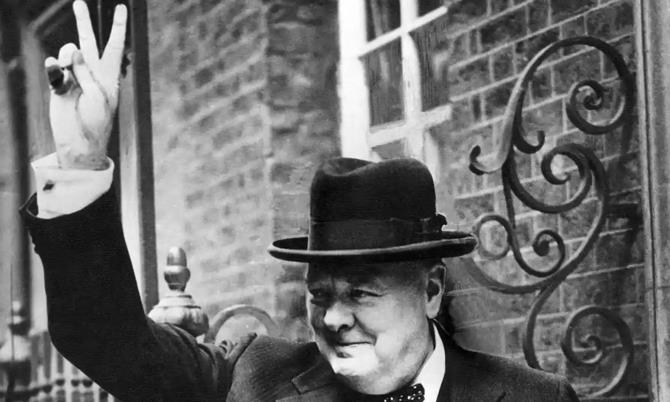
It was on May 7, 1945 — 78 years ago on Sunday — that Nazi Germany signed an unconditional surrender, bringing an end to the tragedy of the Second World War in Europe. Nearly 85 million people died in all theaters of this war, either due to the direct results of conflict or because of related factors such as starvation or disease. Victory in Europe Day was proclaimed on May 8 and V-E Day has been celebrated on this date every year since (although Russia and some Eastern European countries use May 9). Keeping in mind the lessons of the Second World War, which was the deadliest conflict in the history of humanity, is critical.
Whenever discussing and examining the Second World War, one prominent and important political figure ought to always be remembered and mentioned: Winston Churchill. Without doubt, Churchill shaped the Allies’ strategy and helped lead Britain and Europe through the devastating war. The UK prime minister gave his famous victory speech on May 8, declaring: “My dear friends, this is your hour. This is not victory of a party or of any class. It’s a victory of the great British nation as a whole. We were the first, in this ancient island, to draw the sword against tyranny. After a while we were left all alone against the most tremendous military power that has been seen. We were all alone for a whole year.”
One of the most important lessons to remember from this deadly war is that tensions between countries should not be underestimated, since they can easily spiral out of control and lead to a full-fledged war, which can have devastating effects on all parties involved.
Between the beginning of the war in September 1939 and its end, more than “100 million (and possibly as many as 300 million) combatants entered the fray. Many never returned … The most up-to-date estimates calculate that between 70 million and 85 people died in the Second World War. That estimate equates to roughly 3 percent to 3.7 percent of Earth"s population at the time … The following countries have the highest estimated Second World War casualties: the Soviet Union (20 to 27 million), China (15 to 20 million), Germany (6 to 7.4 million), Poland (5.9 to 6 million), Dutch East Indies/Indonesia (3 to 4 million), Japan (2.5 to 3.1 million), India (2.2 to 3 million), Yugoslavia (1 to 1.7 million), French Indochina (Laos, Cambodia, part of Vietnam) (1 to 2.2 million), and France (600,000),” according to the World Population Review.
It is important to point out that, in almost any war, civilians bear the brunt of the conflict.
Appeasing the aggressor often further emboldens and empowers it to commit more violence.
Dr. Majid Rafizadeh
Another important lesson is that diplomatic initiatives, dialogue and negotiations are crucial in order to reach an agreement and resolve disagreements and tensions. And if diplomacy fails and aggression from a particular party persists, it is incumbent on the international community to stand firmly against the aggressor.
From the perspective of the leaders of a country that acts with aggression and rejects dialogue or negotiations to resolve tensions, appeasement policies and conciliation may be viewed as a sign of weakness. In fact, appeasing the aggressor often further emboldens and empowers it to commit more violence in order to achieve its ideological, hegemonic, political or economic objectives.
As Churchill pointed out “I say that in the long years to come, not only will the people of this island but of the world, wherever the bird of freedom chirps in human hearts, look back to what we’ve done and they will say ‘do not despair, do not yield to violence and tyranny, march straightforward and die if need be — unconquered.’ Now we have emerged from one deadly struggle — a terrible foe has been cast on the ground and awaits our judgment and our mercy.”
The third important lesson to be learned from the Second World War is that establishing and promoting intergovernmental and international organizations for more effective global governance is significant in preventing wars and promoting peace. These international organizations can evolve over time.
For example, one of the most critical organizations created at the end of the Second World War was the UN, whose primary missions were to maintain peace and security, resolve conflicts between nations and build amicable relationships between countries. Gradually, the work of the UN has expanded to, as it states, touch “every corner of the globe and (focus) on a broad range of fundamental issues, like sustainable development, protection of the environment and refugees, disaster relief and mitigation, counterterrorism, as well as disarmament and nonproliferation.”
Establishing and strengthening other global institutions in the economic and financial landscapes is also key in preventing conflicts between countries. Some crucial examples are the International Monetary Fund, the World Bank and the World Trade Organization. Multilateral agreements make conflicts less likely to occur. They are also likely to be firm and durable because they have been accepted by many states.
The role that global financial institutions play in resolving trade disputes should not be disregarded or underestimated. If not resolved properly, trade disputes can lead to political conflicts or to countries increasing tariffs or adopting protectionist policies that only harm their own economic growth. This was witnessed during the Great Depression of the 1930s. The WTO points out that it has “one of the most active interest dispute settlement mechanisms in the world. Since 1995, 616 disputes have been brought to the WTO and over 350 rulings have been issued.”
In a nutshell, the Second World War has taught humanity many lessons, including the importance of employing diplomacy to avoid full-fledged wars and the significance of setting up international and intergovernmental organizations.
Dr. Majid Rafizadeh is a Harvard-educated Iranian-American political scientist. Twitter: @Dr_Rafizadeh












